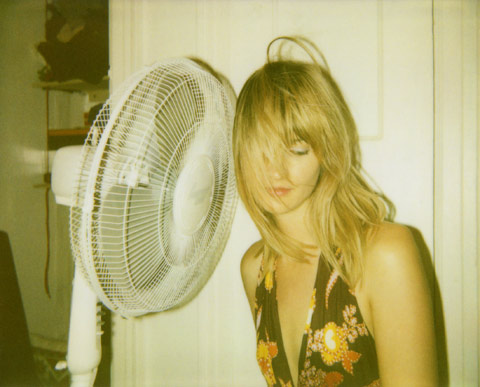
An Interview with Erika Spring of Au Revoir Simone
Erika Spring is a third of Au Revoir Simone—an all-girl synth-pop group which happens to be a favorite of David Lynch. She is also a chanteuse in her own right, frontlining a few solo projects. I caught her during a bustling tour schedule; we were able to drink tea, talk about music and compare recycling strategies.
—Oona Haas
I. SOMEBODY’S GOTTA SAVE THE ROLLER RINK
THE BELIEVER: My first introduction to Au Revoir Simone was in Dairyland (upstate New York) where you and the band were filming the music video for “All or Nothing,” off of the all-keyboard Still Night Still Light. You transformed the place we were staying into this new-age refuge—you and the girls simulated this candlelit séance, creating reflections with glass prisms and crystals. Fast-forward five years, I see you guys on Grand Street filming the “Crazy” music video (a homage to Martin Scorsese’s After Hours) in a far more urban, frenetic environment. That new album, Move in Spectrums, uses other instruments, besides the keyboard. What happened between then and now?
ERIKA SPRING: That’s so cute, that it evolved in those two experiences, and that you were there for both of them! It’s funny looking back at trends. There was a kind of softness that we were trying to embrace with Still Night Still Light. With the new album, we shed that skin a little bit; we were feeling braver and more ready to play with different instruments. The guitar, you can really shred on and play on in this emotional way. A keyboard doesn’t really have that reaction, but I think the parts and the drumbeats that we selected created a different, emotional environment. When we were making Still Night Still Light we were thinking, “Ok, our vision is this: you’re in nature, and it’s like five in the morning right before the sun comes up.” Things are asleep, or closed, and there’s less stimulus around you. You become hyper-aware of sounds, and what is there and awake with you. It was that kind of stillness and that power of observation that inspired the album. The new album is more like, “it’s three a.m., the city is still buzzing; people are still out.” There’s more of that city desire, more heat, more crazed, more like anything can happen.
BLVR: Do you think that has something to do with living in New York City for a longer amount of time?
ES: I don’t think so. I moved here in 2002, but the other girls had both gone...
You have reached your article limit
Sign up for a digital subscription and continue reading all new issues, plus our entire archives, for just $1.50/month.
Already a subscriber? Sign in




